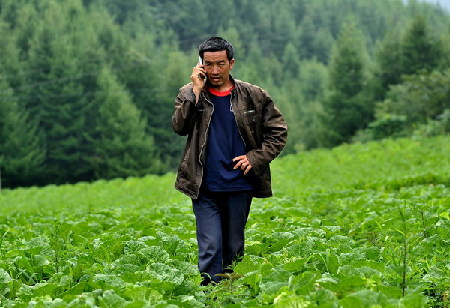Economy
China moves to improve vegetable supply
(Xinhua)
Updated: 2010-08-18 21:01
 |
Large Medium Small |
 |
|
A Chinese trader answers phone calls in a vegetable field in Xuan'en county, Central China's Hubei province, Aug 15, 2010.[Photo/Xinhua] |
BEIJING - China's central government has ordered the expansion of vegetable production, with increased funding and rail links, in a move to stop an "increasingly serious" food supply situation in some major cities.
| ||||
It ordered local governments to stabilize and expand vegetable farms in the suburbs of large cities, with minimum planting areas, and to set up vegetable reserves to meet demand for five to seven days in large cities like Beijing and Shanghai.
In a statement issued after an executive meeting, the State Council pledged more funds and preferential policies to support the construction of major vegetable production bases across the country.
Banks and other financial institutions were encouraged to step up lending to vegetable production firms and individuals.
The State Council also urged efforts to step up construction of special railway lines linking production areas with major cities.
Those who spread false information to manipulate prices would be severely punished, said the statement.
City mayors were to assume responsibility for the so-called "vegetable basket project" to ease pressures on the supply of vegetables and foodstuffs.
The Ministry of Agriculture initiated the "vegetable basket project" in 1988 in a bid to improve production and marketing of vegetables and foodstuffs.
Under the project, about 4,000 wholesale agricultural produce markets were established across the country.
State Councilors at the meeting presided over by Premier Wen Jiabao heard that vegetable prices had fluctuated sharply in some large cities, with the supplies affected by frequent floods this summer.
"On one hand, it is difficult for farmers to sell their vegetables; on the other hand, urban residents have to endure expensive vegetables," the statement said.
"This coexisting contradiction has become increasingly serious."
The statement said, "We will strengthen the government's macro control over the vegetable market and give full play to the market mechanism to increase vegetable supplies."
Boosted by rising food prices after widespread floods, China's consumer price index, one of the main gauges of inflation, rose to 3.3 percent year on year in July, its highest level since October 2008.
The July CPI figure has exceeded the 3-percent full-year target the government set in March this year.
Food prices, which account for about a third of the weighting in calculating the CPI, climbed 6.8 percent in July, compared with June's increase of 5.7 percent, the National Bureau of Statistics (NBS) said in its monthly report last week.
Because of severe floods across China, vegetable prices surged 22.3 percent in July from a year earlier, grain prices were up 11.8 percent while poultry product prices rose 4.1 percent, said the report.



